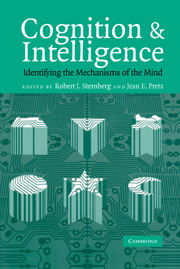Book contents
- Frontmatter
- Contents
- Preface
- 1 Information Processing and Intelligence: Where We Are and Where We Are Going
- 2 Mental Chronometry and the Unification of Differential Psychology
- 3 Reductionism versus Charting: Ways of Examining the Role of Lower-Order Cognitive Processes in Intelligence
- 4 Basic Information Processing and the Psychophysiology of Intelligence
- 5 The Neural Bases of Intelligence: A Perspective Based on Functional Neuroimaging
- 6 The Role of Working Memory in Higher-Level Cognition: Domain-Specific versus Domain-General Perspectives
- 7 Higher-Order Cognition and Intelligence
- 8 Ability Determinants of Individual Differences in Skilled Performance
- 9 Complex Problem Solving and Intelligence: Empirical Relation and Causal Direction
- 10 Intelligence as Smart Heuristics
- 11 The Role of Transferable Knowledge in Intelligence
- 12 Reasoning Abilities
- 13 Measuring Human Intelligence with Artificial Intelligence: Adaptive Item Generation
- 14 Marrying Intelligence and Cognition: A Developmental View
- 15 From Description to Explanation in Cognitive Aging
- 16 Unifying the Field: Cognition and Intelligence
- Author Index
- Subject Index
- References
9 - Complex Problem Solving and Intelligence: Empirical Relation and Causal Direction
Published online by Cambridge University Press: 23 November 2009
- Frontmatter
- Contents
- Preface
- 1 Information Processing and Intelligence: Where We Are and Where We Are Going
- 2 Mental Chronometry and the Unification of Differential Psychology
- 3 Reductionism versus Charting: Ways of Examining the Role of Lower-Order Cognitive Processes in Intelligence
- 4 Basic Information Processing and the Psychophysiology of Intelligence
- 5 The Neural Bases of Intelligence: A Perspective Based on Functional Neuroimaging
- 6 The Role of Working Memory in Higher-Level Cognition: Domain-Specific versus Domain-General Perspectives
- 7 Higher-Order Cognition and Intelligence
- 8 Ability Determinants of Individual Differences in Skilled Performance
- 9 Complex Problem Solving and Intelligence: Empirical Relation and Causal Direction
- 10 Intelligence as Smart Heuristics
- 11 The Role of Transferable Knowledge in Intelligence
- 12 Reasoning Abilities
- 13 Measuring Human Intelligence with Artificial Intelligence: Adaptive Item Generation
- 14 Marrying Intelligence and Cognition: A Developmental View
- 15 From Description to Explanation in Cognitive Aging
- 16 Unifying the Field: Cognition and Intelligence
- Author Index
- Subject Index
- References
Summary
INTRODUCTION
The breadth of human problem solving is truly striking. On the one hand, human problem solving makes possible the most wondrous achievements, such as “an 800-seat airliner with wings that blend smoothly into the fuselage instead of protruding from its sides that is scheduled to be in the air by 2006” (AP news from February 9, 2001). Yet, on the other hand, errors in problem solving can lead to catastrophic and near-catastrophic disasters, such as, for instance, the nuclear reactor accident at Three Mile Island, Pennsylvania, in 1979. Whatever “problem solving” is, and scientists disagree vehemently on the proper meaning of the term, there can be little doubt that it has shaped human culture to an extent that is almost unrivaled by any other human ability.
From the inception of the concept of “intelligence,” the ability to solve problems has featured prominently in virtually every definition of human intelligence (e.g., Sternberg & Berg, 1986). In addition, intelligence has often been viewed as one of the best predictors of problem-solving ability (e.g., Putz-Osterloh, 1981; Putz-Osterloh & Lüer, 1981). Thus, whatever the causal relation between the two concepts, prevailing theoretical positions strongly suggest that intelligence and problem solving are related. In this chapter we concentrate on complex rather than on simple problem solving. Our main goal is to review the extent to which the ability to solve complex problems is indeed tied, empirically, to intelligence and to discuss which causal direction holds between the two concepts.
- Type
- Chapter
- Information
- Cognition and IntelligenceIdentifying the Mechanisms of the Mind, pp. 160 - 187Publisher: Cambridge University PressPrint publication year: 2004
References
- 3
- Cited by

